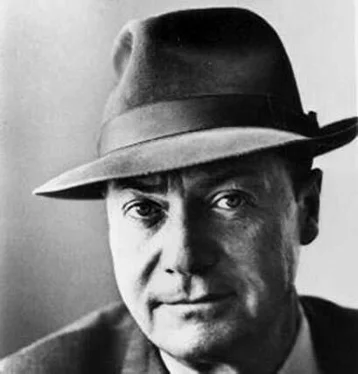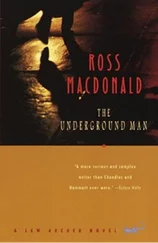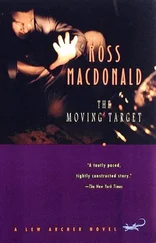“If you haven’t seen her for twenty years, she won’t be a girl any more.”
“Fifteen,” he corrected me. “It’s fifteen years since I had word of her. She was only twenty-one or -two at the time. She still isn’t old, no more than thirty-seven. She’s still got twenty good years in her. So have I.” He spat out flakes of tobacco onto the floor, and pointed the frayed end of his cigar at me. “I come from a long-lived family.”
“Good for you. What’s her full name?”
“Rose Breen, unless she’s married. If she’s married and raising a family, I guess it’s all off. But I got to find out.”
“Where was she when you heard of her fifteen years ago?”
“Up the pike a piece from here, in a town called Santa Teresa. You know it?”
“I know it. What was her address?”
“I don’t have that. All I can give you is the name of the people she worked for. She was a kind of a baby-sitter, or nurse. They hired her to look after their little boy. He isn’t so little now.”
“You’ve seen him?”
“Yeah, I went up there day before yesterday on the bus. He gave me a bad time. They all did. They’re very la-di-da.” In a flash of savage satire, he minced on his misshapen feet, making effeminate gestures with his hands. “All I wanted to ask them was where Rose went, but they didn’t even let me get to first base. Something about me that puts people off, I dunno. Maybe I lived too long in a – on an island. People don’t like me.”
He looked at me as if he hoped I’d deny it. I didn’t like him. There was an odor about him, and it wasn’t the odor of sanctity. It was whiskey and fear and cigars and appalling loneliness. And sickness or evil – they have the same smell – as penetrating as chlorine in my nostrils.
The word goodbye rose like a gorge at the back of my tongue. I swallowed it. He interested me.
“You haven’t told me the name of the family Rose worked for.”
“It was Chantry. It isn’t any more. She lost her husband or something and married a second time – a doctor named Leverett. They’re still living in the Chantry house on Foothill, though, 265 Foothill Drive. That’s the rich end of town.”
“I know.”
He didn’t hear me. He was off on a private kick: “When I realize my finances, I got a good mind to buy in there, spang in the middle of the Foothill district. They think they can brush me off? I’ll show ’em. Naw.” His voice dropped, and he shook his head. “It’s too rich for my blood, I guess.”
I prompted him: “You say they gave you a bad time.”
“They froze me out. The lady – Mrs. Leverett – she acted like I was trying to insult her when I brought up the name of Rose Breen. But then she said she never heard of her. I told her I knew damn well she did, I had it on good authority. Then she admitted she knew her, fifteen years ago. I asked her where Rosie went, and she called in her husband and son to throw me out. I could have handled them.” His fists clenched and unclenched. He looked down into his palms, crossed by curved black lines of ineradicable grime. “But what was the use? I didn’t want trouble. All I wanted was Rosie. And I’m willing to bet my bottom dollar the Leverett dame knows where Rosie is.”
“What makes you think so?”
“The way that she reacted to the name. The way they all reacted. You’d think I was asking them for the keys to their safe.”
“Why wouldn’t they tell you, if they knew?”
“Because I wanted them to,” he said with a sour grin. “People never give me what I want. I have to take it, always have had. So I take it.”
He laughed. It sounded like machinery. He tramped around the room swaggering, swinging his shoulders, jostling shadows.
The money test isn’t a particularly keen one, but it was one I had available. If he had made it big, as he said, he wasn’t spending any of it on front.
“There’s a Spanish proverb: ‘Take what you want, then pay for it.’ Under my credit system, you pay for it first.”
“How much?”
“A hundred a day. Two-fifty in advance.”
“What happens if you don’t find her?”
“That’s your tough luck, Mr. Barr. I sell my services, period. You understand a job like this could take me a day, or it could run into weeks.”
“Yeah.”
“Also, she could be dead.”
“Rosie dead? She better not be.” It was a queer smiling threat: I’ll kill you if you’re dead. “You trying to talk yourself out of work?”
“No. I simply want you to understand the conditions.”
“I understand ’em all right.” Better than you do, said his gap-toothed leer. “I understand ’em fine, and mainly you want two-fifty. How do I know you won’t walk out of here with my money and never come back?”
From most other men it would have been an insult. From him it was a natural thing to hear. Barr was living on the ragged edge, holding on with bitten fingernails while hope and suspicion took turns at his liver.
“That’s a chance you have to take. I’m taking a chance on you, too.”
“How’s that?”
“I have an idea there’s more to Rose Breen’s story than you’ve let on. Do you want to tell me the rest of it? It might save time and trouble.”
“There is no rest of it. All I want is for you to locate her, see. When you do find her, I don’t want you talking to her or telling her anything. Just pass the word to me, and I’ll make my own pitch. You got that?”
“Yes.” But I didn’t say that that was what I would do.
He hoisted his roll out of his hip pocket and turned his back on me, crouching over the money like a dog over a red bone. I could smell burning, and it triggered a fantasy: Barr was a dead man who had climbed up out of hell to look for Rose, drag her back down with him into the fire. I was his little helper.
I didn’t like the role. But I took his money, five fifties, and put it away in my wallet. He sniffed:
“Do you smell something burning?”
“It smells like woodsmoke.”
“Damn them!”
He opened one of the glass doors and stepped out onto the balcony. Wisps of smoke were rising past it, yellowish gray against the blue sky. Leaning over the railing, I could see half a dozen boys huddled around a small fire. Most of them were bare-backed; one or two were wearing black rubber shirts. Their surfboards lay around them on the sand.
“Get out of here!” Barr cried. “This is private property.”
The boys looked up in unison. “It isn’t, below the mean high tide line,” one of them said. “We’re below the tide line.”
“Don’t you talk back to me. Scram! Beat it! I pay rent for this place. I don’t pay it so a gang of beach bums can set fire to the property.”
“It’s perfectly safe,” their spokesman said.
“Safe? You must be crazy!”
“Somebody is,” one of the boys muttered. He made the ancient gesture, rotating forefinger pointed at his temple.
Barr picked up a red clay flowerpot containing a dead plant and threw it down at him. It chunked harmlessly into the sand, but the boys began to disperse. Picking up their long boards and carrying them on their heads, they marched off along the beach. The one who had spoken first lingered behind to kick sand on the fire. He didn’t look up again, but Barr stood watching him until he had gone.
He had seemed very large for a minute, larger than he was. Like a rubber figure losing air, he dwindled till he seemed smaller than he was.
“This is the second day in a row,” he said. “They’re trying to make me blow my top. They’re deliberately out to get me.”
“That I doubt.”
“Oh yes.” He grasped my arm. “If it wasn’t planned, they wouldn’t torment me like this. They hate me, see.”
Читать дальше












